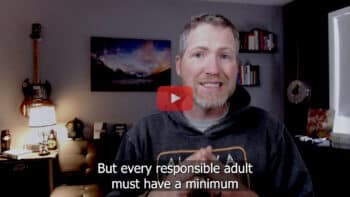The word scares many people. Others seem to embrace the concept as a way of life.
Simply put, debt is what you have borrowed from others to sustain your current lifestyle.
Debt, in theory, is just something you acquire NOW (with other people’s money) and must pay those people back in the future with interest.
This means whatever you borrow, you’re paying back the original amount plus more.
And, like most things in life, a small amount of debt feels relatively harmless. Like small amounts of drugs and alcohol are typically safe.
But the problem is for some, a little bit of “safe” quickly slides into more and more. Then it becomes a big problem.
Debt abuse can quickly turn a “successful life” into an absolute nightmare. Because debt makes you fragile.
It makes you less resilient to life’s inevitable uncertainties.
And when you’re saddled with debt, you lose the one thing that is required for true happiness – your freedom.
So why does anyone fall into a “debt trap”? It’s a combination of things, but one major contributor is that we are very good at justifying our decisions, wants, and desires.
The bottom line is this:
If we want something bad enough, we can create just about any elaborate “justification” out of thin air.
- Massive education expenses – because it’s ALWAYS wise to invest in yourself!
- Extravagant home loans – home prices ALWAYS go up!
- Easy credit card debt – hey now…FREE airline miles!
- Fancy auto loans – I’ve worked hard, so I deserve it now!
Debt is SO easy to justify.
But just because you CAN justify it, should you?
Is debt helpful to your life’s bigger goals and aspirations? Most people think the answer is YES. But before you decide, let’s walk through each type of debt and discuss their justifications and the effects this debt has on your resilience…
Student Loan Debt
Here are a few student loan stats to think about:
- Student loan debt is a $1.5 trillion problem
- The average 2018 graduate left school with $29,800 in debt
- The average student loan payment is between $200 and $299 per month
- Nearly 11% of student loans were more than 90 days past due
- Only 56% of federal student loan debt is actually being paid
Debt, like formal education, should be a temporary condition.
Most of our lives should be lived debt-free, just as large parts of our life won’t be spent in high school or college.
We go to grade school for years, living on the backs of our parents, with the idea we are gaining skills, knowledge, and capabilities that will allow us to live and thrive on our own someday.
We then decide it’s time to further our education with college, but college can be very expensive.
The good news for some students is that mom and dad pony up the cash for school out of love, and the debt vanishes like magic. But is that the best way for a student to learn about the perils of debt?
On the other hand, the parents who do expect repayment might be doing their children a greater favor, teaching them the value of money and the perils of debt.
But MOST parents can’t afford to pay for college, so to get to the career-promised land, many take out student loans.
And this debt is justified as an investment, and it is IF you don’t take on too much…
But I’ve come across many students who’ve graduated with hundreds of thousands of dollars in student loan debt. That’s a very big hole to begin ANY career. Sure, for a doctor or lawyer, these debts can be somewhat justified…
But, sorry, NOT for liberal arts or history majors.
The decision to take on massive student loan debt against a low-wage career is downright irresponsible.
They’ll be paying off that student loan debt for decades to come. Giving away a major chunk of their salaries every month – hindering their ability to accumulate any wealth.
Yet, we hear these sad “student loan debt” stories all the time. It’s like all math goes out the window when we’re talking about “student loans,” and ALL education debt is “GOOD” debt.
But the math is easy.
Take the average salary of your chosen career path – then compare that future salary to a 20-year student loan amortization on the amount of debt it takes to acquire such a career…
Now, what’s the percentage of your salary you must chunk off to pay your student loans?
Obviously, the lower, the better, but I suggest you do everything in your power to keep the percentage of your salary at or below 10% (on a 20-year payback period).
So, for example:
- If your future salary is $50,000 annually, then the maximum student loan amount should be $43,987.
- If your future salary is $100,000 annually, then the maximum student loan amount should be $87,975.
You can use this free online calculator to enter your own information.
But with the cost of college skyrocketing – it can be extremely difficult to get a 4-year education with that small amount of student loans.
That’s why you must map out your future if you want to avoid entering into a debt trap before you even begin your career!
For example, things get “unstainable” when you’re future career is only about $40,000 annually, but you exit school with a 6 figure student loan debt.
And unfortunately, those situations are not rare anymore.
Heck, it’s gotten so bad there’s a movement nowadays to “forgive” these debts.
A call for the government to write them off and give all college students a free education. But “free” is never free – the bill is just transferred to taxpayers…
Now, what unintended consequences would THAT teach those students?
I promise you; it won’t teach anyone how to live within their means now or in the future.
Mortgage and Vehicle Debt
As soon as young adults graduate from school, they need to immediately show their family and friends that they’ve “MADE IT.”
This typically means a big luxurious house and a fancy car.
But most of us cannot pay for our homes upfront.
Few young couples have two or three hundred thousand dollars, or more, burning a hole in their pocket after high school or college.
The same goes for acquiring a new car, though this one is more often associated with debt abuse.
Young people taking on the debt of a house or car should first ask themselves what an appropriate debt is.
- Do I really need the $40,000 car or the $400,000 house?
- Should I buy something cheaper until later in life when I can afford the niceties?
- Should I just rent an apartment for now?
Unfortunately, many discover too late the $650 a month car payment, $200/month insurance payment, and $150/month gasoline bill for that sports car or SUV sucks up their livelihood.
Now couple this with a $2,000/month house payment, a few hundred in utilities, a few hundred more in groceries, student loan payments, credit card payments, and, of course, the inevitable taxes.
Not only are you carrying massive debt, but repayment on the debt portion must also begin immediately and can eat up a large part of your take-home pay, preventing you from ever accruing any real wealth.
And banks are far less forgiving than mom and dad.
On top of the house payment, if you’re an up-and-coming twenty-five-year-old, you’re probably three years into your first job and two years into your first marriage.
You likely have a dog, a cat, and two expensive vehicles sitting in the driveway. You both have an hour’s commute to work – both ways.
On average, you have ten thousand dollars in credit card debt, and you both have about fifty thousand in student loan debt. And – oh, yes – you just found out you’re pregnant.
Now, you’ll get to discover the truly frightening cost of daycare…
With this initial debt level, you can almost guarantee you’ll call your spouse your “ex” in a few years.
You’ve just turned the American Dream into the all too common American Nightmare…
And what about having some funds to prepare for an inevitable future disaster?
Future? Are you kidding? You’re living in a disaster right now. You’re hundreds of thousands of dollars in debt.
You are borrowing a little money each month to pay the last few bills, and you always seem to fall just short.
You’ve tapped out all your lines of credit. You are in debt up to your ears.
You can’t get your head above water in the best of times, much less in a world full of emergencies and surprises.
The only consolation you can take in all this is that you are not alone. Many, many Americans live this way.
Is There A Silver Lining?
So let’s look at the bright side for a moment (IF you happen to live in America).
You at least have the option of running up enormous debt to live a lifestyle beyond most people on Earth.
In many corners of the world, this isn’t even an option. People struggle to survive without Mastercard to buy them time. (BTW: This is why America is also the best place to be a thief – there’s stuff to steal.)
Of course, you’re struggling, too, just in a different way. And, by the way, it all catches up with you eventually.
You may have wished you were that family in India, Kenya, or China. Those people may be living happier lives – even without the trappings of wealth.
Free Lunch? Yes, Please!
Make no mistake. Americans love the trappings of the wealthy and successful. They love those trappings more than they love being successful.
I once asked a group of high school students if they’d like to be successful and wealthy due to some great things they did – like curing cancer, inventing a new supercomputer, or developing some exotic power source – or just wealthy.
If I could guarantee them success in their endeavors, would they rather have earned that wealth or just had it given to them? They ALL choose to have wealth just given to them.
I asked why, and one kid was sincere. She said if she had invented something or started a company or something, then she’d have to worry about that, about keeping it successful, about her employees, or to make it better or to invent the next big thing.
If she were just rich, with no responsibilities, she wouldn’t have to worry about any of that. She just wanted wealth. She wanted the trappings of success without the success (or hard work) that comes with it.
Many Americans want this, not understanding that this virtually assures a surefire journey down the pathway of despair.
Wealth with no goals or purpose does not serve anyone other than yourself. I ask, what’s the point of life?
Still, many of us want this, and we incur debt to get it. And make no mistake – debt is available to be had.
Easy Money For ALL
I don’t think I’ve ever checked out at Home Depot or walked through an airport without someone asking me if I wanted a credit card.
Credit is pushed on us (at least until you begin to renege on your debt).
Society, politicians, and credit card companies want you to borrow and spend money. They encourage it, then bash you over the head when you fall behind and can’t make payments.
It’s like giving free liquor to someone, telling them to relax, drink up, and have fun – until they do so excessively and develop alcoholism.
Then they are scorned by society and looked down upon as weak. Does this mean that credit is bad? No more good or evil than bourbon.
For some, it’s something they use now and then with no ill effect. For others, it’s what they use daily and is destroying them. While in a worst-case scenario, someone is at the end of their rope, and it’s killing them.
How Good Of A Slave Are You?
We even have a system to “score” how good you are at borrowing and paying off debt – it’s called a “Credit Score.” But I prefer to call it an “I Love Debt” Score.
Whenever personal finances come up in conversations, the idea of having a “good” credit score is mentioned. But a “good” Credit Score is NOT a measure of financial success!
It’s only a measure of how “reliable” you are at paying other people back – that’s it.
I hope to have a Credit Score of zero someday!
A Credit Score of zero is more of a symbol of success than a “good” score. Why? Because if you don’t NEED to use debt, then your Credit Score will eventually drop to zero.
And anyone who doesn’t use debt anymore is wealthy.
If your house is paid for, your car is paid for, and you have a ton of money in the bank – you can live a happy, resilient life without having a “good FICO slave” score.
Convenience Vs. Debt – Big Difference
My wife and I use credit cards for almost everything, though sometimes we go through cash-only periods to keep us disciplined.
The trick to using a credit card successfully is to understand it’s merely a convenience, a way to get your money quickly, even a few days before payday.
The trick here is that we’re talking about getting “your money,” not someone else’s.
If you pay off that credit card every month, never carrying a balance you can’t pay off in one fell swoop, then credit cards will remain a convenience, not a source of debt.
Most people cannot be that disciplined, and that small balance left over at the end of the first month becomes larger at the end of the second.
By the third month, carrying that debt becomes a habit necessary to maintain your lifestyle.
Then the credit card becomes a very costly convenience indeed!
“Cash Only” For Ultimate Control
I mentioned cash-only periods.
There are times when my wife will go to the bank right after payday and withdraw $300 – the max allowed at the ATM. She then splits it between us.
We then use that $300 for everything we purchase until it’s gone. It’s not that $300 is all we have. It’s just that having a limited amount in our wallet makes us more discerning in our spending.
We almost always go back to the credit card before the next payday – or we take out another $300 to tide us over.
The bottom line is that our credit card balance is way smaller; we’ve mostly paid as we went, and the exercise makes us more careful about our spending.
Avoid Becoming House Poor At All Costs
Now, I know what you are thinking…
My mortgage will take thirty years to pay off. That’s a lot of long-term debt. Am I just supposed NOT to buy a house?
Of course, you can buy a house – if you can afford it and it does not make you house-poor. And you should never plan on making payments for 30 years.
Only two types of people take 30 years:
- Those who bought way too much house, to begin with
- Those who wish to boost the mortgage industry by paying a whole lot of unnecessary interest.
Not many people fall into the latter category, but many fall into the former.
Here’s a simple rule of thumb, if you and the spouse are working full time, you should be able to make double house payments, or very close to this.
If you can’t – you own too much house.
Sure, you can take the 30-year loan to make sure you can always make the payment should one of you lose their job, but make payments as though you financed for 15 years.
Debt is not just something to be avoided; it also needs to be retired.
How Much Debt Is “Too Much”?
So what is too much debt? How do you define it?
I’m sure some famous investment counselors, bankers, and economic experts have actual values, percentages of income, assets versus debt ratios, and so on to define excessive debt.
I don’t subscribe to any of that. I’m a simple person. Am I carrying too much debt? Ask yourself these simple questions:
- How long will it take me, the way I live, to break even?
- Is money the last thing I think about each night before falling asleep or the first thing I think about when I wake up each morning?
- Do I get a sick feeling in the pit of my stomach when I find a bill in the mailbox?
- Is my marriage suffering because of money?
- Do I dread discussing college with my kids?
- Do you feel helpless when you think about potential disasters that you don’t have the resources to prepare for?
If you come up short on any of those simple questions – you need help.
You notice these questions are not really about money. They are about your emotional well-being and the impacts of debt on your life.
The most significant benefit to retiring debt is not having more to spend or be able to pay cash for things. It’s not even about avoiding writing checks to credit card companies each month.
It’s 100% about how you feel.
Freedom Is Essential For Happiness
Freedom is not going through life with a massive financial burden hanging over your head.
It’s all about losing that shackle around your ankle.
Make no mistake; debt is slavery – slavery you’ve sold yourself into. A large part of your life belongs to someone else.
A portion of every paycheck, every workday, and every hour of work goes to someone else. It’s bad enough we have to work almost a third of our life to pay government taxes; when we spend another third to appease a bank or creditor somewhere, we’re robbing ourselves and keeping ourselves down.
Ridding yourself of debt is about feeling good about yourself, feeling self-reliant, and feeling like a success rather than just looking like one.
You will have a far happier life if you can make it debt-free, and isn’t a happy life worth it?
“Just In Case” Jack
P.s. – Living in fear of debt is the opposite of living a resilient life. If you want to avoid falling into a debt trap or want help to begin your journey of getting out – consider joining THE RESILIENT LIFE.
It’s an intense self-paced program for those who want to become more resilient (and less fragile) to life’s uncertainties.

"Just in Case" Jack
Co-Founder of TheResilientLife.com and SkilledSurvival.com. Creates content, helps members, and is the visionary behind The Resilient Life’s way of living. Husband, father, mechanical engineer, survivalist, and prepper.
See how to find purpose & fulfilment through living a resilient life.





